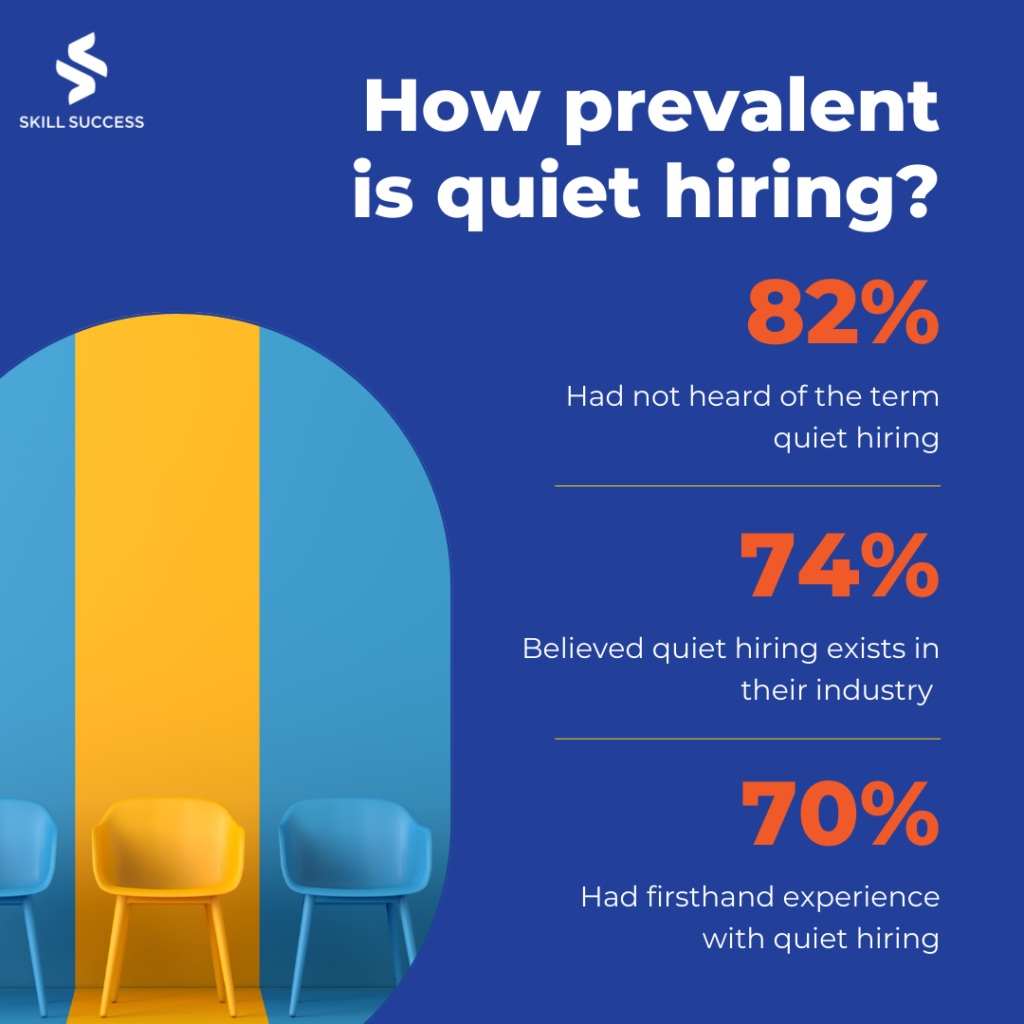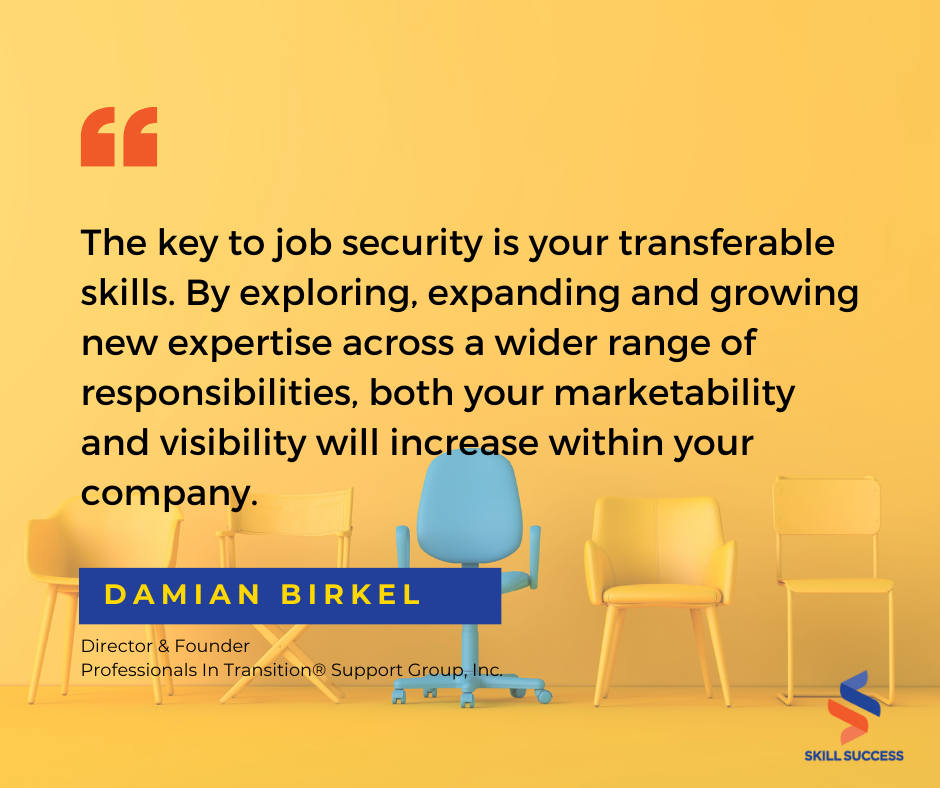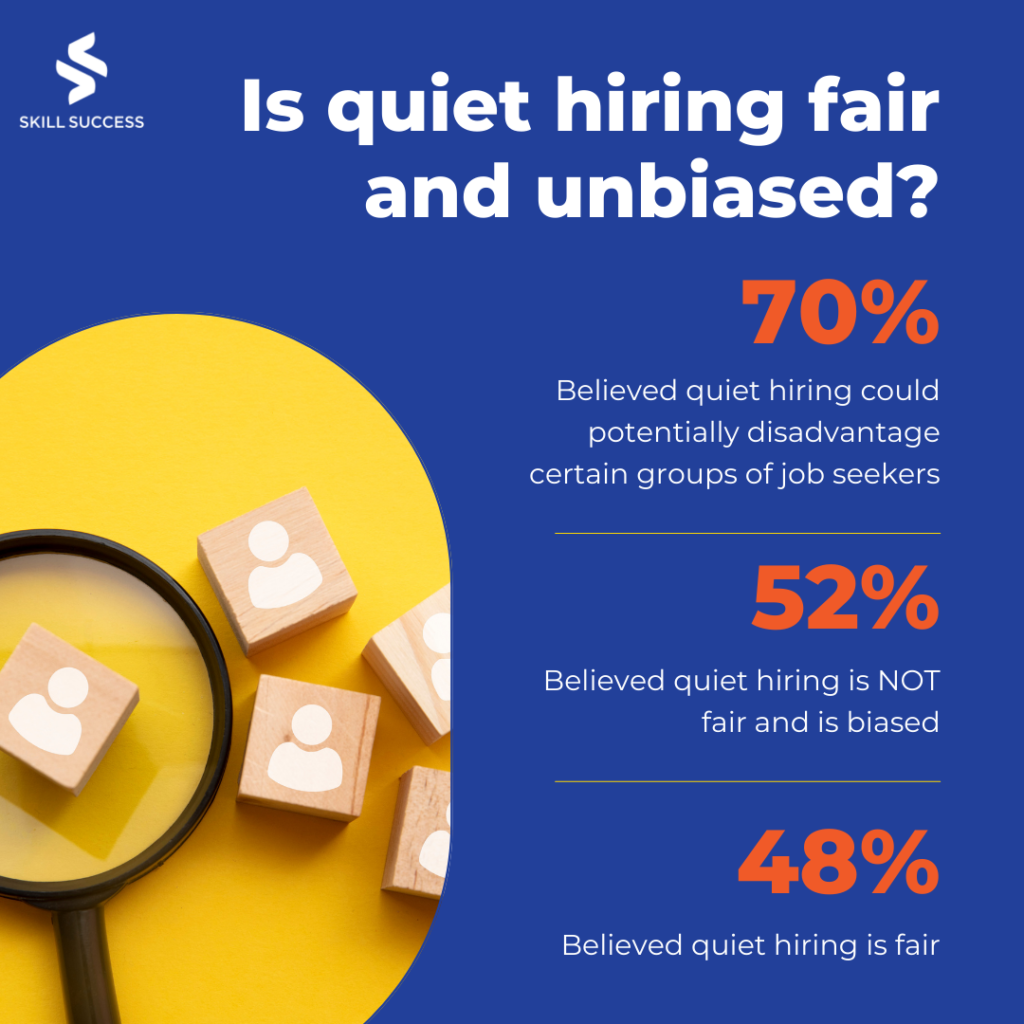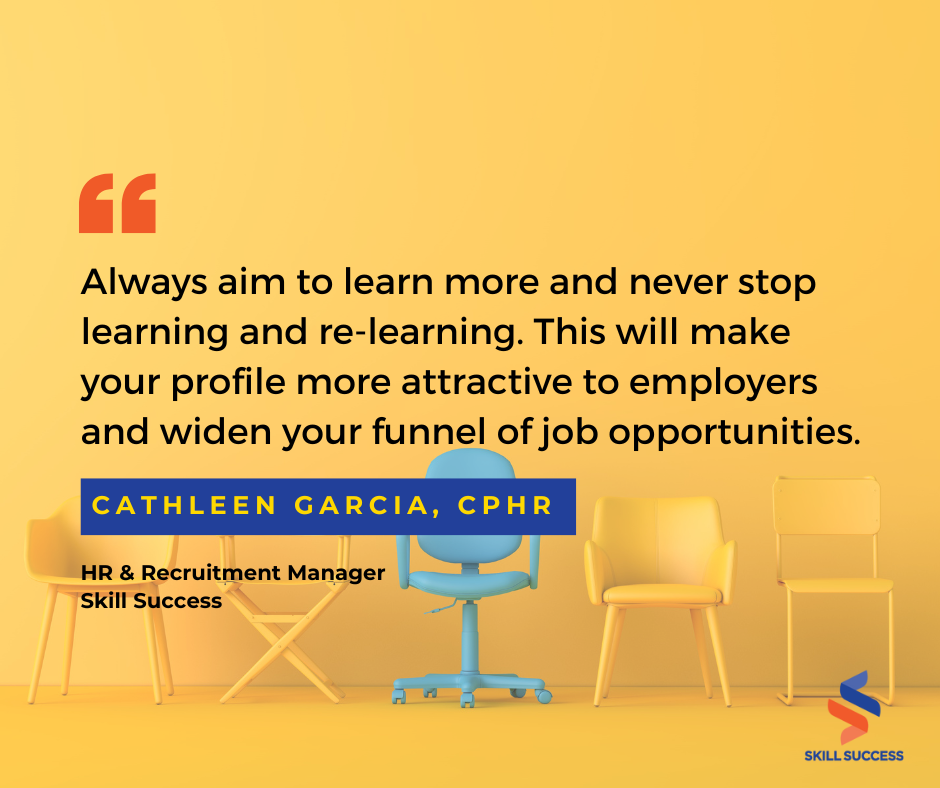
Quiet hiring, one of the emerging workplace buzzwords, refers to a new trend where companies fill positions without publicly advertising them. This can be done by promoting current employees to new roles, hiring freelancers, or using other methods.
Quiet hiring has sparked a significant debate regarding its ethical implications and raised questions about its fairness and transparency. That is why we surveyed professionals from different industries to gather Insights. In this blog, we will share our interesting findings with you.
Our aim is to understand the trends, benefits, and challenges associated with quiet hiring. By examining the data we collected, we hope to shed light on this innovative approach to hiring employees.
The data for this report was collected from a representative sample of lifelong learners on one of the top online learning platforms, Skill Success. The platform has over 500,000 students and 3000 courses. The population consists of professionals, career builders, and entrepreneurs learning business, professional development, technology, and more.
We've also gathered insights from industry experts such as HR professionals, talent acquisition specialists, and executives with experience in recruitment practices.

What is Quiet Hiring?
"Quiet hiring" is a newly coined term that describes a modern approach to finding and hiring employees. It involves a more discreet and behind-the-scenes process compared to traditional methods. Instead of openly advertising job openings and receiving a flood of applications, companies practicing quiet hiring take a more targeted and selective approach.
In quiet hiring, companies often search for potential candidates without publicly announcing job vacancies. They may reach out to individuals who have the specific skill set and qualifications they're looking for, even if those individuals are not actively seeking new job opportunities. This approach allows companies to be more strategic and focused in their search for the right talent.
Evolution of Recruitment Practices
Even though quiet hiring is a buzzword, the concept itself is not new. In fact, it has its roots in the early days of business, when companies would often hire new employees through word-of-mouth or by networking with other businesses. However, the rise of the internet and social media has led to a dramatic shift in the way that companies recruit new employees. Today, most job postings are advertised online, and candidates can easily apply for jobs from anywhere in the world.
This shift has made it more difficult for companies to find and attract top talent. As a result, many companies have turned to quiet hiring as a way to fill open positions without having to compete with other businesses for the same pool of candidates.
What sets quiet hiring apart from traditional recruitment methods?
Skill Success asked Nancy Stewart, the HR Leadership Consultant and the founder of Talent Alchemists, about the difference between quiet hiring and traditional recruitment methods.
According to Nancy, quiet hiring focuses on succession planning, upskilling, retention, and employee development, setting it apart from the usual recruitment process.
She also mentioned that quiet hiring might be seen as a buzzword for a well-established corporate practice rather than a genuinely groundbreaking concept in hiring.
"Recruitment is the process of evaluating, selecting, and onboarding new employees. Quiet hiring is not about recruitment at all; it is about succession planning, upskilling, retention, and employee development. Quite frankly, quiet hiring is nothing more than a gimmicky term for a long-held corporate practice."
How prevalent is quiet hiring?
Most people have not heard of quiet hiring, but many believe it exists, some have experienced it.
The 2023 Skill Success Survey found that 82% of people had not heard of quiet hiring, but 74% believed it exists in their industry or field of expertise. 70% of people had had the experience of being involved in a job opportunity that wasn't publicly advertised or widely known.

Factors Driving the Rise of Quiet Hiring in the Modern Workplace
Several factors contribute to the increasing adoption of quiet hiring in today's workplace:
- Confidentiality and privacy: Companies want to keep important information private when hiring new employees. Quiet hiring helps them do this by keeping the hiring process confidential and protecting their advantage over competitors.
- Targeted approach: Quiet hiring lets companies focus on finding highly qualified candidates who may not be actively looking for jobs. By discreetly reaching out to these passive candidates, employers can find talented individuals who aren't easily found through regular hiring methods.
- Talent scarcity and competition: It's tough to find the best employees in today's competitive job market. Quiet hiring gives companies an advantage by using personalized approaches to attract and secure sought-after candidates who might not be available otherwise.
- Niche or specialized roles: Some jobs require specific skills or knowledge. Quiet hiring helps organizations find the right people for these roles by targeting candidates with unique expertise.
- Agility and responsiveness: Businesses need to be quick and adaptable in today's fast-paced world. Quiet hiring lets companies fill open positions rapidly, so they can respond promptly to changing needs without long hiring processes.
- Cost efficiency: Hiring and training new employees can be expensive. Quiet hiring reduces these costs by promoting internal promotions or employee referrals.
- Gig economy: The gig economy is also contributing to the rise of quiet hiring. In the gig economy, people often work on a freelance or contract basis, which means that they are not always actively looking for new jobs. However, companies can still reach out to these people through social media or other channels.

Skill Success conducted an insightful interview with Damian Birkel, Director & Founder of Professionals In Transition® Support Group, Inc., to explore how the modern job market has shaped the prevalence of quiet hiring practices.
Birkel noted that the COVID-19 pandemic and the widespread adoption of work-from-home prompted innovative thinking from both companies and employees. During WFH, savvy employees embraced the flexibility to pursue continuous learning, with many opting for online courses and certifications to enhance their skills.
However, as people returned to work, the job market experienced significant changes due to mass layoffs, leading to a shift in the hiring landscape. As a consequence: Hiring amidst firing became very quiet.
"Because hiring amidst firing has such a huge impact on morale and may cause potential “blowback” from the public, external hiring sources became low key and many times came through networking, employees, alumni groups and recruiters."
Another form of quiet hiring, not involving an increase in headcount, was achieved by: Redeploying current employees to match the company's priorities.
Giving employees stretch assignments and upskilling opportunities helped companies adjust to changing needs while supporting employees' career goals. This approach offered growth opportunities for workers while meeting the organization's evolving needs.

Exploring the Pros and Cons of Quiet Hiring
The discussion surrounding quiet hiring has sparked a lively debate, with opinions divided on whether its benefits outweigh its drawbacks. Some individuals advocate for quiet hiring, believing it to be a fair and effective approach to finding top talent. On the other hand, others express concerns about its fairness, especially for certain groups of job seekers.
Skill Success survey among career builders and lifelong learners results revealed that opinions on whether quiet hiring is fair or not are diverse and not unanimous. However, the majority of respondents acknowledged that quiet hiring could potentially disadvantage certain groups of job seekers.

Here are the survey findings:
- 70% of participants believe quiet hiring could potentially disadvantage certain groups of job seekers.
- 44% of respondents do not believe that quiet hiring shows favoritism toward specific groups.
- 48% of participants considered quiet hiring fair, while 52% expressed reservations about its fairness.
Different perspectives and experiences contribute to varying opinions on this matter. In the survey, 30% of participants held the view that quiet hiring does NOT disadvantage specific groups. When asked about the advantages, here are their answers:
Advantages for Job Seekers:
- Increased chances of securing desired jobs with less competition.
- Access to better-paying positions not widely available.
- Gaining an advantage over other candidates with inside information.
- Enhancing workplace understanding, communication, and teamwork.
Advantages for Employers:
- Cost savings on job advertisements.
- Encouraging growth opportunities through qualified hires.
- Streamlining the hiring process by reducing applicant influx.
- Hiring familiar employees for smoother transitions and skill development.
What do the experts say?
According to the insights gathered from industry experts by Skill Success, quiet hiring brings unique advantages.
- Increased engagement and skill development
Here's what Chris Stott, Director of Seven Marketing, told us about its advantages:
"Internal transfers as a part of covert hiring present an opportunity to increase employee engagement, particularly between coworkers and teams in various geographic locations. Employees that have their job duties changed gain practical experience in the new roles and from cross-functional and cross-cultural cooperation. This improves employee involvement and raises employee morale."
Stott's insights highlight the positive impact of internal transfers within quiet hiring, emphasizing the potential for enhanced collaboration, practical skill development, and heightened employee engagement, contributing to a more motivated and dedicated workforce.
- Keeping sensitive information
Prof. Dr. Te Wu, CEO of PMO Advisory, also shares his insights. His focus centers on the significance of keeping sensitive information, such as the departure of a key employee or plans for new strategic initiatives, confidential through quiet hiring.
"The departure of a key employee or the plans for new strategic initiatives are two examples of the kind of information that can be kept under wraps through quiet hiring. This is especially crucial if the company's reputation or daily operations would be negatively affected if word of the job opening got out. Rather than being inundated with applications from people who aren't a good fit for the position, businesses may take a targeted approach and pick individuals based on certain skills, experience, and qualifications. The recruitment process can now be more targeted and effective as a result."
- Quality over quantity
Vikas Kaushik, CEO of TechAhead, highlights the advantage of quality over quantity in quiet hiring.
Quiet hiring means that companies don't advertise open positions, so there are fewer people who apply. But, the people who do apply are more likely to be a good fit for the company because they were recommended by someone who knows the company well.
"As employees suggest potential candidates, they are more likely to recommend individuals who they believe possess the essential abilities, qualifications, and cultural alignment for the organization as compared to other applicants. This targeted approach has the potential to result in employees of a higher quality, which, in the long run, will save both time and resources."

Disadvantages for Job Seeker:
- Limited job opportunities as companies may not publicly advertise open positions.
- Lack of transparency in the selection criteria used by companies.
- Increased susceptibility to bias, as companies may prefer candidates they know or who are referred to them.
Disadvantages for Employers:
- Reduced workforce diversity, as companies may favor candidates similar to existing employees.
- Heightened bias in the hiring process, with a preference for known or referred candidates.
- Potential damage to the company's reputation due to perceived secrecy or unfairness in hiring practices.
These insights underscore the multifaceted nature of quiet hiring, where perspectives on its potential advantages and drawbacks vary significantly.
What do the experts say?
- Potential for discrimination
According to Scott Allen, Co-Founder & Licensed Agent at Seniors Life Insurance Finder, one significant concern is the potential for discrimination. Companies employing quiet hiring methods may inadvertently favor certain candidates and discriminate against others, as they limit their exposure to a diverse pool of applicants.
"Companies using quiet hiring methods may be more prone to discriminating against certain candidates, as they will not have access to a wide variety of applicants who could potentially fill the position. It is important that companies are conscious of potential biases when using this type of recruitment process."
- Reduced workforce diversity
According to Sudhir Khatwani, the Founder of The Money Mongers, while quiet hiring can be beneficial for maintaining confidentiality and reducing disruptions, it may also result in limited outreach for job postings.
"Quiet hiring, while useful for maintaining discretion or reducing disruptions during the hiring process, can sometimes limit diversity. The limited reach of job postings might exclude potential candidates from underrepresented groups who lack extensive networks."
In today's job market with quiet hiring practices, job seekers should stay proactive, enhance transferable skills, and explore different roles to boost their appeal to employers. Employers need to find the right balance between privacy and diversity, maximizing the benefits and minimizing the downsides of quiet hiring.

Recommendations and Guidelines
How can organizations achieve transparent and inclusive recruitment with quiet hiring?
Based on the survey results on the pros and cons of quiet hiring, we've identified biases, lack of diversity, and possible implications of unfairness as some of the attributes that need consideration. To address these challenges and promote transparency and inclusivity, we consulted 150 experts for their top recommendations.
An overwhelming 90% of these experts stressed the importance of blind recruitment and the use of technology to remove identifying information from applications.
Additionally, experts emphasized prioritizing skills and talent over other criteria like personal connections, gender, and age. By placing merit at the forefront, organizations can create a diverse and inclusive work environment.
They also highlighted the significance of training and educating hiring managers and teams on diversity and inclusion. Raising awareness about unconscious biases and fostering a culture that values diversity will contribute to a fair and equitable recruitment process.
Here are the top expert recommendations related to the use of technology in blind recruitment:
"Leveraging applicant tracking systems (ATS) with blind recruitment features can help remove bias from the early stages of candidate evaluation. These systems anonymize candidate information, allowing recruiters and hiring managers to focus solely on qualifications and experience. Data analytics can also be used to identify potential areas of bias in the hiring process, such as disparities in interview feedback or offer rates for different demographic groups."
"Technology and data analytics can play significant roles. Advanced HR tools can streamline the recruitment process, track potential candidates, analyze skill gaps, and maintain transparency with employees."
"Skills and qualifications should be emphasized in the recruitment process. Data-driven assessments and competency-based evaluations should be used to identify the best candidates based on their abilities rather than subjective factors. During the initial screening process, candidate information should be anonymized using technology. This can involve removing names, addresses, and other identifiable details from application materials to ensure unbiased evaluation."
"Combine quiet hiring with structured interviews, inclusive job postings, and diverse interview panels. Use AI to analyze candidate skills objectively and identify hidden talent through data-driven insights."
Summary:
- Implement blind recruitment features: Utilize applicant tracking systems that anonymize candidate information to remove bias and focus on qualifications during the early evaluation stages.
- Utilize data analytics: Employ data analysis to identify any potential biases in the hiring process, such as disparities in feedback or offer rates for different demographic groups.
- Emphasize skills and qualifications: Prioritize candidates' abilities and qualifications in the recruitment process, using data-driven assessments and competency-based evaluations.
- Use AI for objective analysis: Employ artificial intelligence to objectively analyze candidate skills and uncover hidden talent through data-driven insights.

How can organizations address the exclusion of underrepresented individuals who may not have strong networks?
When we asked industry leaders about this issue, the majority suggested partnering or collaborating with community groups, engaging in networking, or fostering associations. Here are the top recommendations:
"Underrepresented individuals who lack strong networks often miss job opportunities because they don’t have enough connections. Employers can solve this issue by partnering with community groups or attending hiring events geared toward helping underrepresented groups. If you want to implement an equitable hiring process, you must make major changes intentionally. Building a diverse and inclusive hiring process doesn’t just happen automatically; it’s the result of many small choices that add up."
"Proactive action is needed to address the exclusion of underrepresented people with weak networks. As a human resources specialist, I think businesses should prioritize developing diverse talent pools through collaborating with institutions of higher learning, professional associations, and community organizations that support underrepresented groups."
Summary:
- Recognize the impact of limited networks: Be aware of how underrepresented individuals with weak networks may face barriers in accessing job opportunities.
- Take proactive action: Employers can play an active role in addressing this issue by forming partnerships with community groups and participating in hiring events that focus on supporting underrepresented candidates.
- Prioritize collaboration: Establish connections with educational institutions, professional associations, and community organizations to develop diverse talent pools and support underrepresented groups.
Expert Insights from Skill Success
Skill Success aims to shed light on quiet hiring and break the silence surrounding this emerging trend in the job market. In our pursuit of unraveling the intricacies of quiet hiring, we will now share the recommendations and guidelines of our HR & Recruitment Manager, Cathleen Garcia:
For Job Seekers:
With the prevalence of quiet hiring, what advice would you offer to career builders, graduates or applicants seeking to enhance their job prospects and effectively leverage this trend?
- Conduct thorough research: Take the time to search various websites, platforms, and blogs to discover the best job opportunities available. Stay informed about different companies and industries to find the perfect match for your skills and aspirations.
- Invest in lifelong learning: Employers value candidates who are committed to continuous growth. Be proactive in enhancing your skills and knowledge through online courses, workshops, or certifications. A strong focus on learning will make your profile more appealing to employers and open doors to more job opportunities.
- Build your network: Developing networking skills is key in quiet hiring. Join professional groups, attend events, and connect with others in your field. Having a broad network increases the chances of receiving invitations from potential employers.
For Entrepreneurs and Industry Leaders:
What advice would you give entrepreneurs or industry leaders who are actively hiring and want to make the most of the quiet hiring trend?
- Build a clear company profile: Attract top talent by showcasing what makes your company special. Highlight your company culture, values, and opportunities for growth to stand out in the job market.
- Strengthen your referral program: Encourage your employees to refer potential candidates. A strong referral program can bring in high-quality candidates who align with your company's values and culture.
- Boost brand awareness: Leverage digital platforms to increase your company's visibility. Utilize social media, websites, and other digital channels to reach your target audience and share the unique aspects of your company.
- Continuous build of candidate pipeline: Always be prepared for future hiring needs. Even during periods of no active hiring, continue to build a pipeline of potential candidates so that when the time comes, you already have a pool of qualified individuals to consider.

Bonus Tip - Develop Leadership Skills and Drive Innovation
Companies should prioritize the development of strong leadership skills and foster a culture of innovation and creativity. A reputation for being an innovative and resilient business will attract more applicants, regardless of the hiring approach.
Strong leadership inspires employees and nurtures a culture where creativity thrives, leading to groundbreaking ideas. Embracing resilience showcases a company's ability to navigate challenges, making it more appealing to top talent.
Frequently Asked Questions about Quiet Hiring
What is quiet hiring?
Quiet hiring is a discreet recruitment approach where companies fill job positions without widely advertising or publicly announcing the opportunities. Instead of relying on traditional job postings, companies may use targeted networks, referrals, or internal channels to find suitable candidates.
Why is it called "quiet" hiring?
The term "quiet" hiring stems from the low-profile nature of the process. Unlike traditional recruitment methods that involve public job postings, quiet hiring operates with a level of confidentiality and limited public attention.
How prevalent is quiet hiring?
According to a survey, approximately 74% of respondents believe that quiet hiring exists within their respective industries or fields. It indicates that many companies employ this approach to some extent.
Why do companies use quiet hiring?
One reason is to save money on recruiting costs. Another reason is to fill open positions quickly. Finally, some companies use quiet hiring to maintain a competitive advantage by keeping their hiring plans under wraps.
What do experts recommend for equitable hiring?
Experts advise implementing data-driven assessments and competency-based evaluations to emphasize skills and qualifications rather than subjective factors. Furthermore, fostering inclusive practices, such as structured interviews, diverse interview panels, and objective candidate analysis through AI, contributes to equitable hiring.
What are the legal implications of quiet hiring?
There are no specific legal implications of quiet hiring. However, companies should be careful not to discriminate against external candidates or to violate any employment laws.
Is continuous learning important for job seekers?
Absolutely, continuous learning and upskilling are vital in today's dynamic job market. Staying updated with new knowledge and skills enhances job seekers' competitiveness and adaptability, increasing their employability and career opportunities.

Key Takeaways
Statistics about Quiet Hiring in 2023:
- 82% of people were not aware of quiet hiring.
- 74% believed quiet hiring exists in their industry or field.
- 70% had experienced involvement in a job opportunity not publicly advertised or widely known.
- 70% of participants think quiet hiring could potentially disadvantage certain job seeker groups.
- 44% do not believe quiet hiring shows favoritism towards specific groups.
- 48% considered quiet hiring fair, while 52% had reservations about its fairness.
We hope this survey helps you gain a better understanding of quiet hiring, including its prevalence, implications, and advice from experts.
As advocates of continuous learning and upskilling, we encourage you to stay ahead in your career journey. Embrace lifelong learning by subscribing to Skill Success All Access Pass. It grants you unlimited access to a diverse range of courses like business skills, project management leadership, career and personal development.
Make the most of the insights from this survey, and in pursuit of your goals, remember that dedication to learning is a key that opens doors to a brighter and more fulfilling future.

